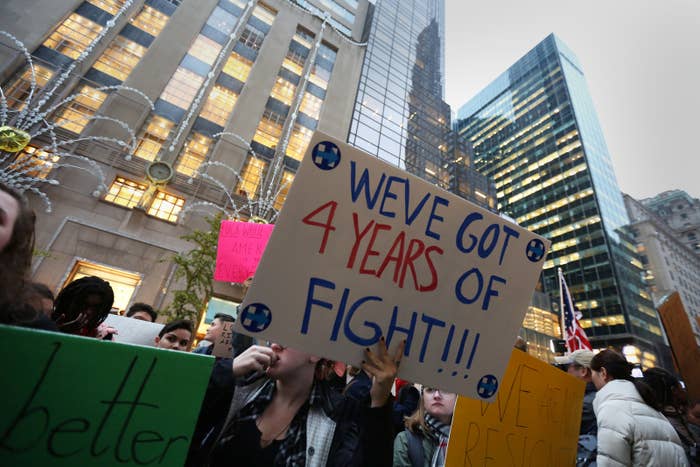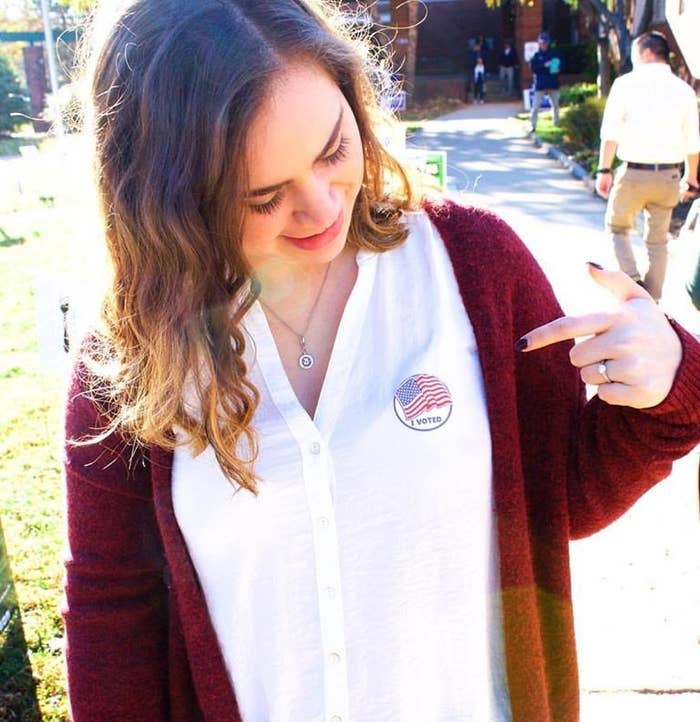
Tuesday was Fabiana Diaz’s first time voting as an American citizen. Like many twentysomethings, she celebrated by posting a photo on Facebook of her “I Voted” sticker with a few reasons why she cast a ballot for Hillary Clinton, one of them being that she is a sexual assault survivor.
Diaz hardly got any sleep knowing that Donald Trump would become the next US president.
“It’s taking me back to that night of my assault where I felt alone, where I didn’t feel believed,” the 22-year-old Diaz told BuzzFeed News on Wednesday. “This is half of America telling me they don’t stand by me.”
Diaz’s family immigrated to the United States in 1999, and she grew up in a small town in Michigan. Having experienced her fair share of racial discrimination, including people yelling at her to speak English, Diaz was against Trump long before October, when video leaked of Trump in 2005 boasting about kissing women without their consent and grabbing them “by the pussy.” Surely, America would not elect a man who made those comments, Diaz thought.
“But that’s my circle, that’s my newsfeed,” Diaz said. “Yesterday showed me that my newsfeed does not reflect America, and that’s what’s really hard to grasp.”
Natalie Green, the 24-year-old organizer of the social activism #AllOfUs campaign, helped stage demonstrations featuring survivors like herself speaking against Trump. Many activists incorrectly thought Trump’s chances of victory were shot after the 2005 tape leaked, she said.
“If we are cool with electing a sexual predator to be president,” Green said, “what aren’t we cool with?”
Trump’s victory stunned pollsters and pundits. But it especially rattled sexual assault survivors and activists, who felt that the country would reject a businessman known for making offensive comments about women. It became even more personal for survivors following the revelation of Trump’s 2005 comments, and as 12 women publicly accused him of sexually assaulting them. Trump has vowed to sue his accusers.
"Waking up to a Trump victory today, I have not felt this violated, unvalued, or disrespected since the day of my assault,” said Lauren, a survivor in Berkeley, California. A survivor named Anna, a 27-year-old in New York, agreed. “It's like the country had a referendum on whether I matter and they voted no,” she said.

Anne Seymour didn’t report her sexual assault or even tell those close to her about it for over a year, because she feared being blamed for it. But eventually she got involved with activism on campus at the University of California, Berkeley. She served on a university task force on the issue and provided insight as a Congressional intern for a bill Rep. Jackie Speier (D-California) sponsored to reform campus rape policies.
At that point, Seymour said, “I felt valued and was optimistic for the future.” But after last night, “I feel like I'm back at square one.” She decided to dress in black Wednesday and not wear makeup so that people could see her red, puffy eyes, and the physical and emotional toll the election had on women and survivors, she said.
During the returns, Harper-Grace Niedermeyer sat in a room in Birmingham, Alabama, listening to two men defend Trump’s past sexist statements and the accusations against him “as something that men just do.”
“This is the largest wound that I have yet to have felt in the entire process of advocating for myself and others, while simultaneously doing the work to heal and move on from the assaults I have endured,” Niedermeyer said. “I am severely disappointed in my country — that they would allow someone who openly disregards women and speaks of sexually assaulting them and puts it off as ‘locker room talk’ to be the leader of our country.”
Survivors like Cyn, a 25-year-old in Berkeley, felt especially betrayed seeing their friends and loved ones, who knew about their assaults, vote for Trump in this context. Others, like Margot Mayer, a recent Vassar College graduate, worry about the societal impact of having someone in the highest office whom they consider an “abuser of women.”
“Every man across the country now sees that they too can assault and demean women, then get away with it,” Mayer said. “It is heartbreaking.”
While Kimberly Theidon, a professor of humanitarian studies at Tufts University, took her dogs for a walk on Wednesday morning, she thought about the numerous times guys have driven by and shouted “some disgusting version of ‘great tits.’”
“This morning I blinked back tears, realizing those guys are even more emboldened as a result of this election,” Theidon said. “Yet another generation of young women will grow up having been made to feel that their bodies are somehow public property, and they will also keep putting one foot in front of another and not say a word for fear the car will circle back around a second time.”
Yong Jung Cho, a 26-year-old leader of #AllOfUs, said a friend told her about being catcalled at New York City's Penn Station recently, and when she didn’t respond, the harasser yelled, “Fuck you, I can’t wait until Donald Trump becomes president!”
“I am nervous about the message [Trump’s election] sends to young girls, and boys and men in this country about what is OK,” said Cho, who organized a candlelight vigil in front of the White House for Wednesday evening. For women like Cho and Michele Dauber, a Stanford University law professor who was heavily involved in activism following the Brock Turner sexual assault case at Stanford, Trump’s victory is a call to action.
“This election means that now more than ever, we are going to have to stand up and fight back,” Dauber said.
